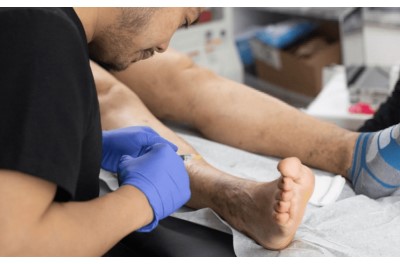
Advantage of Understanding What Vein Centers Do: A Comprehensive Guide
Vein centers specialize in diagnosing and treating various vein-related conditions, offering targeted care for issues ranging from spider veins to more complex venous disorders. In this guide, we will explore the functions of vein centers, their services, and how they can benefit those with vein-related concerns. If you’ve ever wondered, “What do vein centers do?” this article will provide a detailed answer.
What Are Vein Centers?
Vein centers are specialized medical facilities focused on diagnosing and treating venous disorders. They offer a range of services designed to address issues with veins, which are blood vessels that carry blood back to the heart. These centers typically employ a combination of advanced diagnostic tools and minimally invasive procedures to manage various vein conditions.
Services Offered at Vein Centers
Vein centers offer a variety of services tailored to the needs of patients with venous conditions. Here are some of the primary services you can expect:
- Diagnosis and Evaluation: Comprehensive evaluation begins with a detailed medical history and physical examination. Advanced imaging techniques, such as ultrasound, are often used to assess the condition of the veins. This helps in diagnosing issues such as venous insufficiency, deep vein thrombosis (DVT), and chronic venous disease.
- Minimally Invasive Treatments: Vein centers often use minimally invasive procedures to treat vein disorders. These treatments include sclerotherapy, laser therapy, and radiofrequency ablation. Each method is designed to target and treat problematic veins with minimal discomfort and downtime.
- Surgical Options: For more severe cases, vein centers may offer surgical interventions. This might include vein stripping or other procedures to remove or close off problematic veins. Surgeons at vein centers are trained to perform these procedures with precision to ensure the best possible outcomes.
- Preventive Care and Management: Vein centers also focus on preventive care to help patients manage their condition and prevent future issues. This includes lifestyle advice, recommendations for compression stockings, and ongoing monitoring to ensure the effectiveness of the treatment.
How Vein Centers Benefit Patients
Understanding what vein centers do can help you appreciate the advantages of seeking specialized care for vein-related problems. Here are some key benefits:
1. Specialized Expertise
Vein centers are staffed by specialists who have in-depth knowledge and experience in treating venous disorders. This specialized expertise ensures that patients receive accurate diagnoses and effective treatment plans tailored to their specific needs.
2. Advanced Technology
Vein centers utilize cutting-edge technology to diagnose and treat vein issues. This includes advanced imaging techniques that allow for precise diagnosis and minimally invasive treatment options that reduce recovery time and improve patient outcomes.
3. Minimally Invasive Procedures
One of the major advantages of vein centers is their use of minimally invasive procedures. These techniques typically involve less pain, reduced risk of complications, and faster recovery compared to traditional surgical methods. Patients can often return to their daily activities more quickly after treatment.
4. Comprehensive Care
Vein centers provide comprehensive care that addresses both the immediate and long-term needs of patients. From diagnosis and treatment to preventive care and management, these centers offer a holistic approach to vein health, ensuring that patients receive thorough and continuous care.
Common Conditions Treated at Vein Centers
Vein centers treat a range of conditions related to vein health. Understanding these conditions can help you determine if you might benefit from visiting a vein center.
1. Spider Veins
Spider veins are small, dilated veins that appear close to the surface of the skin. They are often red or blue and can be unsightly, leading many individuals to seek treatment. Vein centers offer various treatments, such as sclerotherapy, to improve the appearance of spider veins.
2. Varicose Veins
Varicose veins are larger, swollen veins that can be painful and cause discomfort. They are often a result of chronic venous insufficiency, where the veins fail to properly return blood to the heart. Vein centers use treatments like radiofrequency ablation and laser therapy to address varicose veins.
3. Chronic Venous Insufficiency (CVI)
CVI occurs when the veins in the legs are unable to effectively return blood to the heart. This condition can lead to symptoms such as swelling, pain, and skin changes. Vein centers provide specialized treatments to manage CVI and improve patient quality of life.
4. Deep Vein Thrombosis (DVT)
DVT is a serious condition where a blood clot forms in a deep vein, usually in the legs. It can lead to complications such as pulmonary embolism if not treated promptly. Vein centers are equipped to diagnose and manage DVT, often working in collaboration with other medical professionals.
Choosing the Right Vein Center
Selecting the right vein center is crucial for effective treatment and care. Here are some tips for choosing a reputable vein center:
1. Check Credentials
Ensure that the vein center is staffed by board-certified specialists with experience in treating venous disorders. Look for centers with positive patient reviews and a track record of successful outcomes.
2. Evaluate Technology and Treatments
Consider the technology and treatment options available at the vein center. Advanced diagnostic tools and a range of treatment options can indicate a center’s commitment to providing high-quality care.
3. Consultation and Communication
A good vein center should offer thorough consultations where you can discuss your symptoms, concerns, and treatment options. Effective communication with your healthcare provider is essential for a successful treatment experience.
Conclusion
Understanding what vein centers do can help you make informed decisions about your vein health. These specialized facilities offer comprehensive care, advanced treatments, and expert guidance to manage and improve venous disorders. Whether you’re dealing with spider veins, varicose veins, or other vein-related conditions, seeking care at a vein center can provide you with the specialized attention and effective solutions you need. If you’re experiencing symptoms related to vein health, consider reaching out to a vein center for a thorough evaluation and personalized treatment plan.
Leave Your Comment